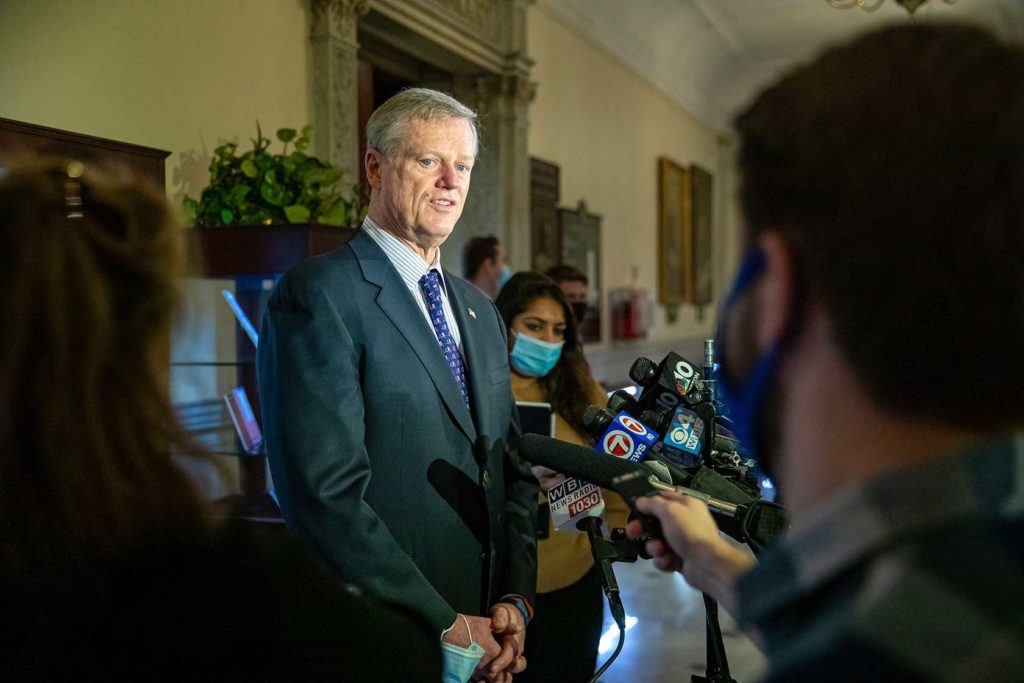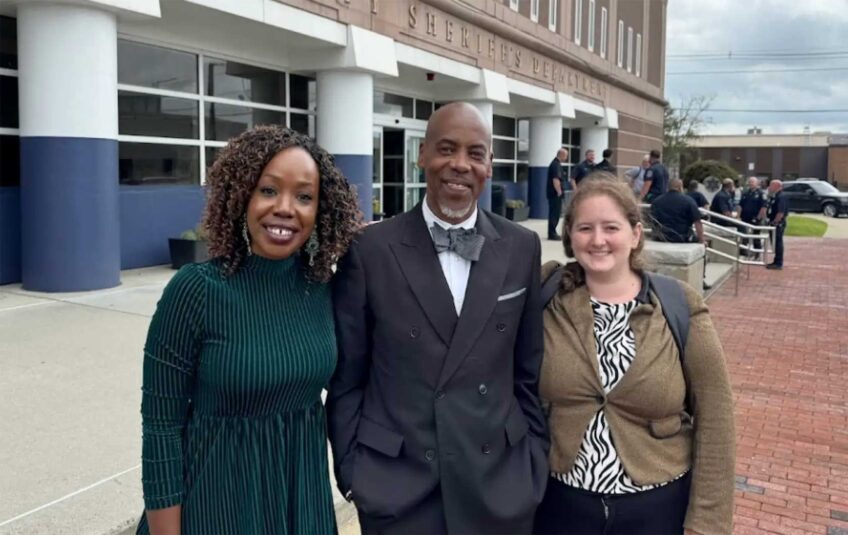Officials pan gov’s COVID response
Public health officials call for mask mandate

Elected officials and public health officials came together last week to take aim at Gov. Charlie Baker’s handling of the latest COVID-19 surge that has already infected thousands and will likely infect more as families continue to gather for the holidays.
Led by Sen. Becca Rausch of Needham, who called out Baker for taking “grossly and inexplicably insufficient action” to stop the spread of COVID-19, the press conference was also attended by Dr. Julia Raifman of Boston University School of Public Health, Dr. Mei Elansary of the Boston University School of Medicine, Dr. Julia Koehler of Harvard Medical School, Jodi Sugerman-Brozan or Massachusetts Coalition for Occupational Safety and Health (MassCOSH) and Heloisa Galvão of Massachusetts Brazilian Women’s Group.
Baker’s latest policies for containing the coronavirus include the activation of hundreds of National Guard personnel to assist at state hospitals and a call to put a pause on non-essential medical procedures in order to free up beds. In addition, Baker has issued an updated non-binding mask advisory that recommends all residents, regardless of vaccination status, wear a face covering in indoor spaces.
The group that met Tuesday had harsh criticism regarding the governor’s refusal to institute a more stringent mask mandate, inequity in the state’s school testing program, a disintegration of workplace COVID safety measures, poor vaccine outreach and insufficient access to testing for all Bay State residents. To remedy what they see as glaring gaps in the state’s response, those at the press conference, along with more than 100 public health and medical professionals and 36 community organizations, have endorsed the “Massachusetts COVID-19 Action Plan,” which would institute an indoor mask mandate and attempt to address the uneven resources available to communities fighting to prevent major outbreaks.
“The governor’s persistent refusal to follow CDC guidelines on mask-wearing and failure to provide a data-driven blueprint to keep our residents safe puts all of us, families and businesses alike, at risk — disproportionately our elders, our at-risk community members and our youngest children who still have no access to vaccines,” Rausch said.
She went on to accuse Baker of using science as a “mere talking point” and said she and others across the state are calling on the governor to protect public health.
Baker has doubled down on his approach, telling Boston Public Radio this week that rather than masks, vaccines and testing are the state’s best defense.
Raifman, during last week’s press conference, said that “mask advisories are not sufficient to achieve everyone in an indoor space wearing masks” and that “mask policies help us continue to come together to reduce spread at work, in schools, and in public spaces more safely during surges.”
Schools and work
As the virus continues to spread, the COVID-19 Action Plan supporters are calling for several measures to promote safety in schools, including sufficient funding and staffing for contact tracing, opt-out pool testing and remote learning options.
Currently, COVID-19 testing for Massachusetts students is opt-in, meaning parents are having to actively agree and sign their children up to be included in school testing. The protocol has left many untested and unable to participate in “test and stay” initiatives which would allow students to not miss class as long as they continue testing negative.
“Our state COVID testing program for schools is critically important,” said Dr. Elansary, who added that remote learning options, continued mask-wearing with access to high-quality masks such as KN95s, and improved ventilation are all essential to mitigating school transmission.
The opt-out testing system has been widely supported by educators and advocates, as is the option for remote learning days. The state has made it clear that, as with the case of an outbreak here at Boston’s Curley School, they will not count virtual days towards the mandatory school days for the year.
For workplaces, the Action Plan looks to curb viral spread through “statewide workplace safety standards as well as paid sick time for employees experiencing COVID-19 symptoms, potential exposures, or temporary adverse effects from vaccination.”
“While vaccines are a critical safety measure, keeping workers safe requires a comprehensive approach that includes proper ventilation, distancing, masking and training. Variants like omicron have shown that vaccines alone are not enough,” said Sugerman-Brozan, whose organization has been rallying behind frontline healthcare workers, first-responders, grocery store workers and public transit workers since the start of the pandemic.
MassCOSH has asked employers and state government to ensure that employees not only have adequate distancing, handwashing and masking, but also to have notification when their coworkers get sick and return-to-work plans if they get sick themselves.
Several of the speakers noted that many of the frontline workers across the state are Black and Latino, and that the data on rates of infection for those groups has reflected the risk of in-person work.
According to Dr. Koehler, Black and Latino residents have had a threefold death rate compared to white Massachusetts residents and much of the continued mortality can be blamed on the lack of state-run vaccination efforts.
“Our frontline communities are still far behind except where community-led efforts … enable the residents to take up vaccines,” she said.
Galvão, who has been in charge of leading some vaccination clinics and giving out other localized coronavirus aid within her community, agreed. She said the Brazilian Women’s Group has been responsible for nearly 1,000 vaccine shots through hundreds of clinics. However, she added that other challenges, including having food and housing when and if people get sick, have been devastating.
“Our community has not had the luxury to stay home … these are the people that have to make the decision to either get COVID or starve,” she said.
Protecting frontline workers
The coalition behind the COVID-19 Action Plan is asking the governor to go a step further in protecting workers’ health by protecting them against foreclosures, evictions and rent increases in order to decrease home crowding and stop the spread to entire families.
They’ve also asked for support for frontline communities and local boards of public health through “culturally relevant outreach, technical and infrastructural assistance to boards of health and community health centers, and financial support for struggling residents, regardless of immigration status,” to bring equity to the pandemic response.
That support would include funding and staffing of daily mobile vaccination clinics in frontline communities disproportionately represented in COVID-19 cases.
“Instead of handing money, millions, to for-profit entities that are failing at vaccination outreach in frontline communities … that are failing at vaccine delivery,” Koehler said. “It is frontline community organizations, community centers in these communities that are able to do this work and have successfully done it when they’ve received the resources.”
On Boston Public Radio, Baker said his administration will “help local communities with anything they want to do that is additional or different than what we are up to, and that is going to continue to be our policy.”






